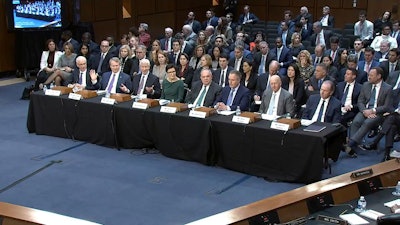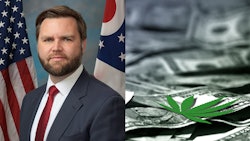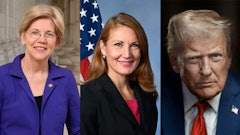
U.S. Sen. Raphael Warnock, D-Ga., asked eight CEOs of the largest banks in the nation to raise their hands if they support the SAFER Banking Act during a three-hour Senate Banking Committee hearing Dec. 6.
At first, only one of the eight banking bigwigs—Brian Moynihan, the CEO and chairman of Bank of America—lifted one finger to indicate his backing of the Secure and Fair Enforcement Regulation (SAFER) Banking Act.
The other seven CEOs looked among one another to see where each stood on the issue.
The legislation, which awaits Senate Majority Leader Chuck Schumer’s call for a floor vote, aims to provide protections for federally regulated financial institutions that serve state-sanctioned cannabis businesses, regardless of the plant’s federal classification as a Schedule I controlled substance.
“None of you support the SAFER Banking Act?” Warnock asked.
Moynihan eventually raised his hand halfway, while Jamie Dimon, chairman and CEO of JPMorgan Chase & Co., lifted his arms slightly with both palms facing up, gesturing as if his answer was more complex than a simple yes or no.
“Senator. We all support the intent of it. The problem is it doesn’t fix the problem. So, don’t take our non-ascensions as—” Moynihan said, before Warnock cut him off.
“Let me ask my next question,” Warnock said. “Raise your hand if you believe passing the SAFER Banking Act will reduce—will reduce—the racial wealth gap.”
Again, Moynihan flipped his hand up momentarily while the majority of his peers remained still as statues.
The other CEOs also included Charles Scharf, of Wells Fargo & Co.; Jane Fraser, of Citigroup; Ronald O’Hanley, of State Street; Robin Vince, of Bank of New York Mellon; David Solomon, of Goldman Sachs; and James Gorman, of Morgan Stanley.
“So, this is interesting, and so we should have some conversation about this,” Warnock said. “The American Bankers Association, of which all of you are a part, writes that this legislation will provide ‘legal and regulatory clarity’ for banks, and it would help facilitate access to financial services.”
Warnock said he still questions who will benefit from that legal and regulatory clarity and who will be made safer as a result of the legislation.
Warnock was the lone Democrat in the Senate Banking Committee to oppose the SAFER Banking Act during a Sept. 27 markup hearing, arguing the legislation would only benefit cannabis investors while leaving behind those most impacted by the drug war. “My fear is that if we pass this legislation, if we greenlight this new industry and the fees and the profits to be made off of it without helping those communities, we will just make the comfortable more comfortable,” he said at the time.
RELATED: SAFER Banking Act Approved in Committee, Signaling Major Victory for Cannabis Reform
During Wednesday’s three-plus hour Senate Banking Committee hearing entitled, “Annual Oversight of Wall Street Firms,” Warnock decided to focus his five minutes on the SAFER Banking Act during the hybrid panel format that covered myriad banking issues.
“Since the war on drugs began over 50 years ago, communities across America have been decimated,” Warnock said. “They’ve been hollowed out. Communities all across our country in the wake of the explosion of mass incarceration, making us the mass incarceration capital of the world, missing bodies and abandoned buildings—the war on drugs has been war on communities of color.
“I want to be clear that I am open to SAFER banking and more regulatory clarity around cannabis, but my fear is that if we pass this bill right now, then your banks and other powerful voices will be missing in action when it comes time to address the broader harms of the war on drugs. And so I support SAFER Banking. You all seem reluctant to say whether you support it or not. I’m concerned about equity and whether we will get that in the process.”
Warnock then asked the CEOs if each of them will commit to ensuring their banks will uphold the standards in the Community Reinvestment Act to increase equity should Congress move forward on passing the SAFER Banking Act.
The Community Reinvestment Act is federal law designed to encourage commercial banks and savings associations to help meet the needs of borrowers in all segments of their communities, including low- and moderate-income neighborhoods, according to the Federal Reserve Board.
“Yes, senator,” Scharf, of Wells Fargo, said.
“Yes, sir,” Moynihan, of Bank of America, said.
“We support the intent, but I would have to see the actual words and the actual law,” said Dimon, of JP Morgan Chase, who made the palm-up hand gesture earlier.
“Would you support efforts to be intentional about supporting equity and addressing the awful impact of 40 years of the war on drugs, which in many ways has been the war on Black and Brown communities?” Warnock asked.
“Yes, but before I agree to something, I’d like to see the actual detail, down to the last word,” Dimon said.
“I absolutely support the intent, but the details the matter. We’d look at it and work with your office if we had concerns,” Fraser, of Citigroup, said.
“We support the intent,” O’Hanley, of State Street, said.
“We would want to see the detail,” Vince, of BNY Mellon, said.
“I would want to understand the detail more. We will continue to do things to support investment in underserved communities,” Solomon, of Goldman Sachs, said.
“Exactly the same. Same,” Gorman, of Morgan Stanley said.
Warnock concluded by saying, “I think this is critical. There’s nothing in history that suggests to me that if we leave behind these communities that are marginalized, as we make banking safer for powerful banks and people in positions who sit here and who sit there, there’s nothing in history that suggests to me that we’re going to go back and get those folks. And so I hope that I can continue to engage you and that as good corporate responsible citizens, you will take an active interest in this, recognizing that it’s not only the right thing to do for the future of our economy; it’s the smart thing do."


























